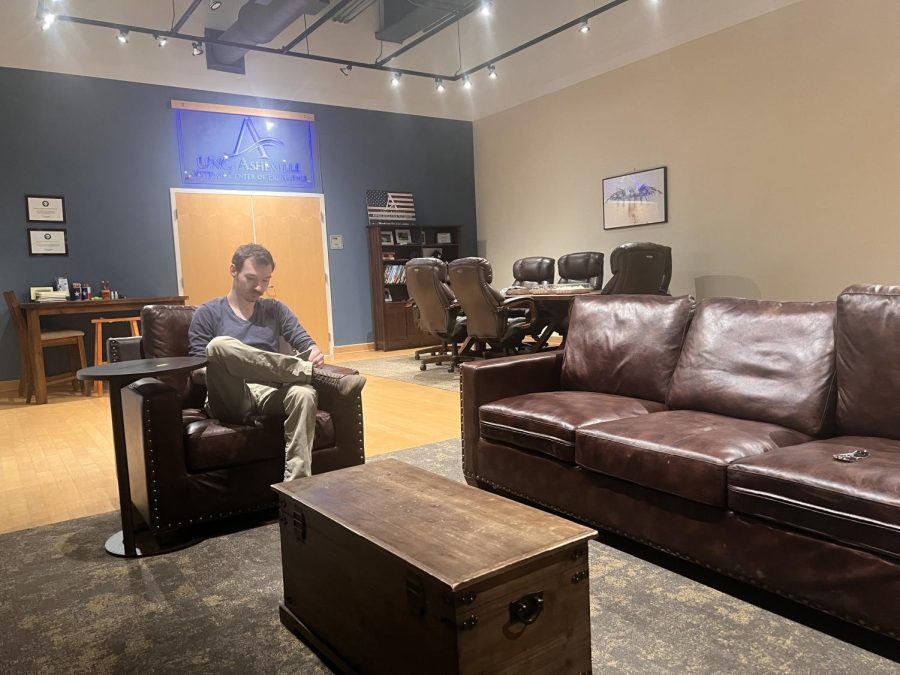UNCA helps student veterans return to civilian life
Sophomore and Veteran Frank Arrington utilizing the Veteran’s Center in Highsmith to read and study.
March 27, 2023
UNC Asheville does a lot to ease veterans’ transition into civilian life. The veterans themselves often lack awareness of the school’s efforts. Other in-state schools offer more, according to the North Carolina Military Affairs Working Group.
“I know there were some resources. I would’ve liked to see more veteran organizations on campus. I was never really clear about how many vets were there, aside from the few I met in classes,” said Zach Brubaker, a 31-year-old alumnus of UNCA. He graduated in 2020 and is a veteran of the Air Force.
“I usually didn’t share my status as a vet, just as I never considered living on campus. There was just a bit of a liberal feel and I didn’t want to stigmatize myself.”
Half of in-state colleges and universities offer veteran specific housing or assistance with off-campus housing, according to the NC MAC. This group was established in 2015 within the governor’s office.
Their purpose is to advise and counsel the governor on ways to better accommodate the veteran population in North Carolina. The NC MAC keeps a list of 36 different amenities potentially offered by any of the 16 state schools. Only the University of North Carolina School of the Arts and North Carolina Central University offer less to Veterans than UNCA.
“I’m a liaison between UNCA and the VA. I submit confirmation that student veterans are enrolled so benefits can be paid,” said Amanda Deweese, a student services specialist and the only VA certifying officer at UNCA. “When I started in 2008, there was no Post 9/11 GI Bill. UNCA didn’t have a large Veteran population. We aren’t located near a base.”
Since September 11th student Veterans and their families have had more access to education benefits, then did earlier generations of Vets.
“The post-9/11 GI Bill changed who could get and use VA education benefits. Now benefits can be transferred to dependents. Our population of students using these benefits has doubled,” Deweese said. “We currently have 92 students enrolled using GI Bill benefits. This is down a bit from our pre-pandemic average of 100-115.”
NC MAC tracks three main types of GI Bill, used by student veterans. The oldest and most well-known is the Montgomery GI Bill. It only paid tuition for business, technical or vocational courses. It also covered distance learning, apprenticeship job training, flight training and licensing exams. It also expired 10 years after a service member was honorably discharged.
The post 9/11 GI Bill was created in 2008. Veterans with at least 90 days of service qualify for some benefits. Honorably discharged veterans who served one year receive full benefits. This pays tuition at any public in-state school as well as a monthly housing allowance and book stipend.
The post 9/11 GI Bill expires 15 years after discharge. The last and most recent creation, the Forever GI Bill, went into effect in January 2012. It has all the benefits of the post 9/11, but as the name suggests it never expires, according to the Veteran Administration.
“We have a vet center now, a designated space. We have programming and a student organization we didn’t have when I first came into this position,” said Deweese. “The UNC system office has a dedicated group that looks at veteran issues and GI Bill changes. They have recommended we offer priority registration to students who are using the GI Bill benefits. The GI Bill requires certain classes, so this will help those students get the classes they need. We will also be waiving application fees for incoming Veterans.”
These changes will be announced in the next month and will count as two additional amenities on the NC MAC’s list. According to Deweese, there were faculty members who themselves were veterans. They engaged heavily with the veteran community on campus. Those faculty members have since retired. Deweese said she is unsure if any current faculty are veterans.
“All things considered, I’m glad I went to UNCA. It served me well enough. I was drawn to the area and I was interested in studying health and wellness promotion. I explored the school and things just clicked. I was even able to start the Psychedelic club in 2019,” said Brubaker.
At UNCA there are currently 2,676 students enrolled for the spring 2023 semester. With only 92 students using the GI Bill, this equates to a student veteran population of 3.4%, according to the UNCA Office of Strategy and Analytics.
“My fiancé and I took a road trip cross-country. We liked the mountain’s rustic vibe and Asheville’s great food scene,” said Aaron Buyanov, 33, an Army veteran and graduating senior at UNCA.
The administration may open its doors, but vets still struggle to connect with the student body.
“My experience at UNCA has been fine for the most part. Sometimes it’s hard for me to dissociate myself as a person, from being an ex-soldier. So I don’t know how much my experience over there colors my experience here. Had I not been through that, maybe I would see it differently. Maybe I wouldn’t feel it’s this generation or this school specifically. There’s something about the way kids have this notion of the world as a place that can be made perfect. Since this is the case, sometimes I feel disappointed,” said Buyanov, an Asheville police officer.


















